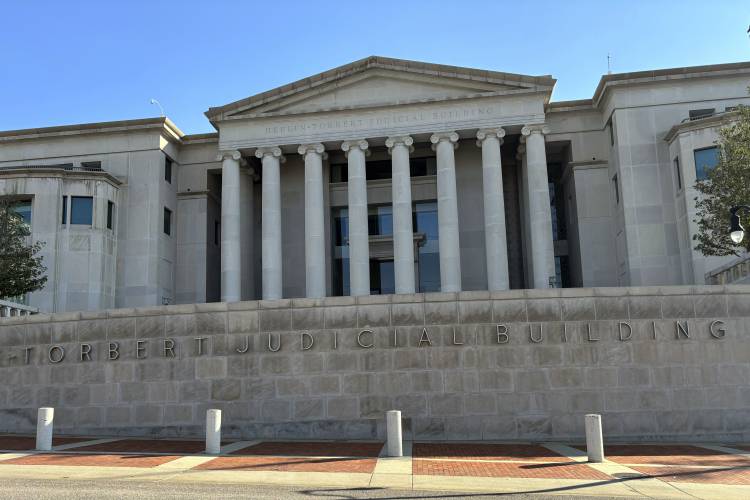My Turn: What’s wrong with the Alabama embryo decision

The exterior of the Alabama Supreme Court building in Montgomery, Ala., is shown Tuesday, Feb. 20, 2024. The Alabama Supreme Court ruled, Friday, Feb. 16, 2024, that frozen embryos can be considered children under state law, a ruling critics said could have sweeping implications for fertility treatments. The decision was issued in a pair of wrongful death cases brought by three couples who had frozen embryos destroyed in an accident at a fertility clinic. AP PHOTO/KIM CHANDLER
| Published: 03-10-2024 12:15 PM |
The recent Alabama Supreme Court decision that asserts embryos are children reflects a central misunderstanding about human reproduction. Fertilizing an ova initiates a biological process that can result in a successful pregnancy and birth, but more than 1 in 4 known pregnancies end in miscarriages; that figure is certainly higher if we consider the number of times a fertilized egg does not develop to the point that the woman even recognizes she is pregnant. Neither the earliest post-conception cells (the blastocyst) nor the subsequent embryo constitute more than the potential for a human being.
The court appears to have ignored the compelling arguments about a woman’s right to decide whether or not to proceed with a pregnancy. It then confused the potential for human life with false certainty about reproduction, a move that has unpalatable consequences even for opponents of abortion.
If an early stage embryo is a child, then miscarriages would require death certificates. Women suffering miscarriages, which can already be traumatic, could be subject to legal scrutiny under various criminal statutes. As critics have already noted, in vitro fertilization (IVF), which depends on the over-production of fertilized eggs and subsequent selection, could also be prosecuted as murder. It would also make it less likely that a potential surrogate would be willing to take the risk of being criminally charged if, through no fault of her own, a miscarriage follows implantation.
These are some of the potential consequences of the Alabama decision, but there is an even more serious fault at the base of the court’s argument. The concurring opinion written by Justice Tom Parker — which cites Biblical passages nearly two dozen times — reveals the reliance of the court on moral judgments drawn from Christian doctrine.
This is a profound violation of the Establishment Clause of the First Amendment to the Constitution, which guarantees freedom of worship but prohibits state and federal governments from advancing one religion over others or over non-faith convictions.
Even recent Supreme Court decisions promoting accommodation of religious beliefs (e.g., allowing prayer at public high schools) do not challenge the basic premise that the law must not infringe on the rights of citizens by forcing believers of different faiths, or who do not hold religious views at all, to follow the edicts of any one religion. That principle applies even if a majority of citizens adhere to one faith. This constitutional guarantee is what protects us from becoming a theocracy, along the lines of the governments of Iran and Afghanistan.
Although the Alabama decision is, in my opinion, clearly at odds with the U.S. Constitution, any appeal would be heard by the same justices that made the egregious decision in the first place. It is unlikely that the court would consider an appeal because the decision does not explicitly relate to federal law and because it applies only to Alabama.
Article continues after...
Yesterday's Most Read Articles
The only recourse is through the political process, which has produced a new Alabama law signed last week that aims to protect those involved in IVF from prosecution — though it avoids any consideration of the basic claim about personhood in the court’s ruling. Given the dominance of conservative and right to life politicians in the state, it is not likely that the core of the decision will be reversed with legislation.
Even if there is a permanent carve-out for IVF, the citizens of Alabama will have to abide by a legal ruling that not only runs counter to the Constitution but also creates a plethora of risks for every woman who may become pregnant or wish to do so with the help of assisted conception.
Donald Joralemon, emeritus professor at Smith College, lives in Conway.

 Araceli Katalin McCoy: Why we should change the voting age to 16
Araceli Katalin McCoy: Why we should change the voting age to 16 Emily Gaylord: Shores Ness brings experience
Emily Gaylord: Shores Ness brings experience Arlene and Doug Tierney: Vote for Blake Gilmore on May 6
Arlene and Doug Tierney: Vote for Blake Gilmore on May 6 David Dempsey: The Carnegie Library is overdue for an upgrade
David Dempsey: The Carnegie Library is overdue for an upgrade
